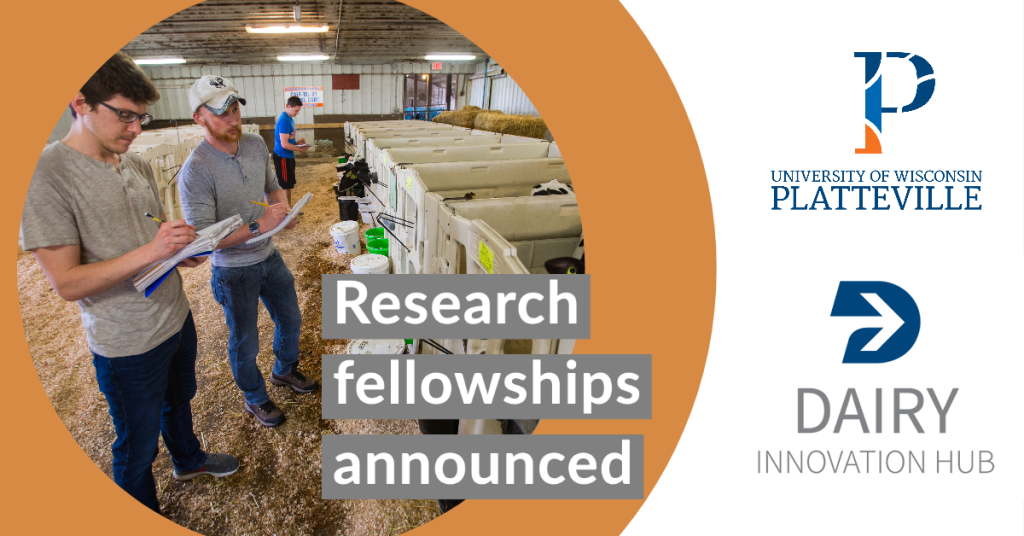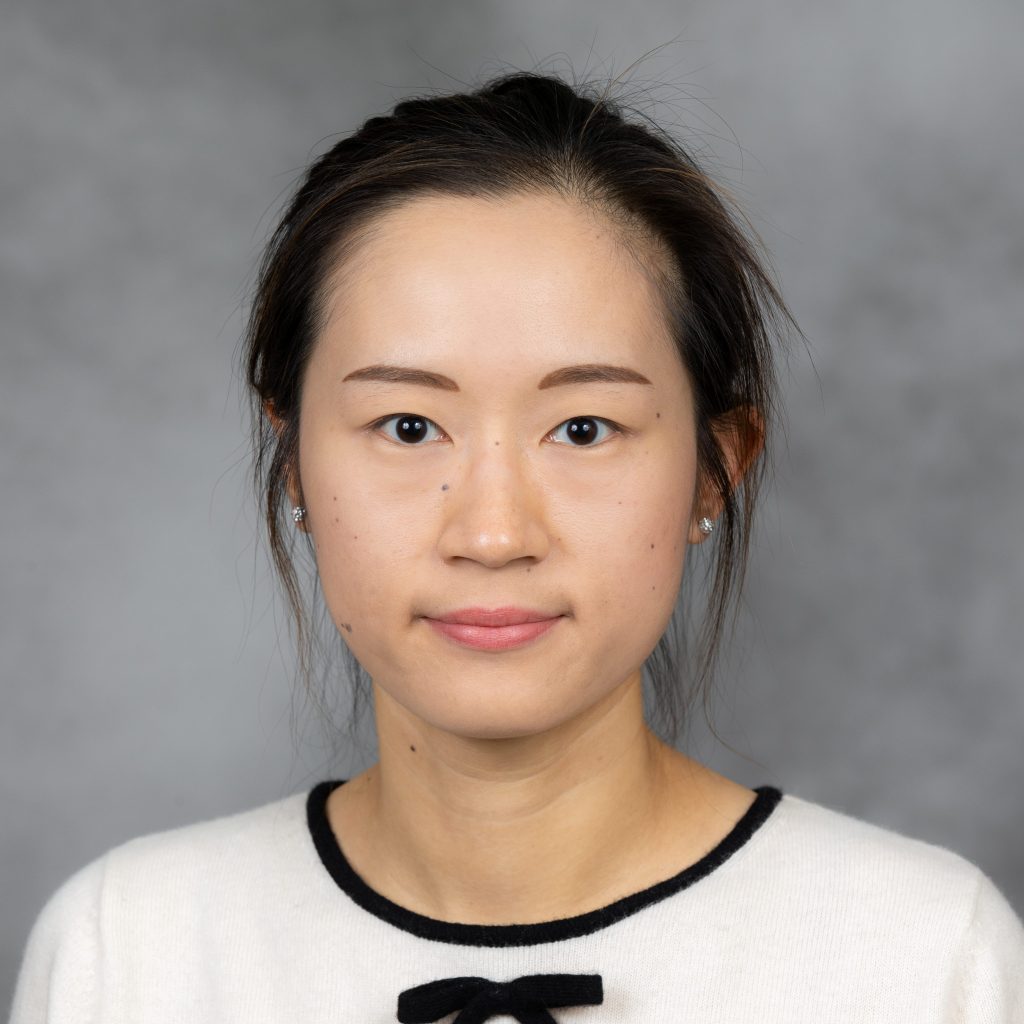
The University of Wisconsin–Platteville recently awarded six faculty research fellowships to increase dairy-related research capacity through the Dairy Innovation Hub initiative. Known as the Dairy Industry Impact Innovation Faculty Fellowships, or “DI3 faculty fellowships”, the selected faculty members will tackle research projects in the Hub’s four priority areas; stewarding land and water resources; enriching human health and nutrition; ensuring animal health and welfare; and growing farm business and communities.
Funded through a $7.8 million per year investment by the state of Wisconsin, the Hub harnesses research and development at UW–Madison, UW–Platteville and UW–River Falls campuses to keep Wisconsin’s $52.8 billion dairy community at the global forefront in producing nutritious dairy foods in an economically, environmentally, and socially sustainable manner. Since its launch in 2019, the Hub has funded more than 250 projects across the three campuses.
A faculty research fellowship is a temporary position for permanent faculty members. The goal is to provide support for a specific research project and any ancillary costs — including ensuring that the faculty member will have time to conduct the research and support for existing teaching responsibilities.
The following UW–Platteville faculty fellows were selected for funding:
Rich Crow, School of Agriculture
“Increasing nutritional density of alfalfa through the application of locally sourced effective microorganisms”

Crow is an assistant professor at UW–Platteville with a strong background in agronomy, agricultural education, and technology integration. He is also a certified Commercial Drone Pilot and Commercial Pesticide Applicator. With extensive experience in teaching, advising, and academic leadership, he is passionate about preparing students for careers in modern, technology-driven agriculture.
Project Summary: As dairy farmers seek more sustainable and cost-effective ways to boost herd health and productivity, researchers at UW–Platteville are turning their attention underground to the soil microbiome. This study investigates the use of locally sourced effective microorganisms (LEMs) to enhance the nutritional density of alfalfa, a foundational feed crop for dairy cows. By improving the availability of critical nutrients like calcium, magnesium, and zinc, LEMs could naturally enrich alfalfa’s nutrient profile, reducing the need for synthetic feed additives. This field-based research aims to validate how microbial amendments can promote soil biodiversity, support nutrient cycling, and ultimately strengthen the nutritional quality of homegrown forage for Wisconsin’s dairy herds.
Joseph Sanford, School of Agriculture
“Evaluating nitrogen availability from solid-liquid-separated and composted manure: phase two”
Sanford is an assistant professor in the School of Agriculture at UW–Platteville, funded by the Dairy Innovation Hub. His research focuses on managing agricultural wastewater, including runoff, nutrient management, manure application, water recycling, pathogen control, and emerging contaminants like PFAS.

Project Summary: With ongoing support from the Dairy Innovation Hub, UW–Platteville researchers are expanding their efforts to evaluate nitrogen availability from solid-liquid-separated and composted manure under real field conditions. Building on findings from phase one, which revealed that current nutrient credit guidelines may significantly underestimate nitrogen availability in processed manure, this next phase will test those results in practical on-farm environments. With manure processing technologies like solid-liquid separation and anaerobic digestion growing in popularity, this research aims to provide more accurate data for nitrogen application. Results from this work will inform future revisions to Wisconsin’s nutrient management guidelines and promote sustainable manure application strategies that support crop productivity and environmental stewardship.
“Impact of biochar on composting dairy manure and soil health: a comparative study”
Project Summary: As soil degradation threatens the long-term productivity of agricultural systems, a new study at UW–Platteville explores how biochar can play a dual role in both manure management and soil restoration. This research investigates the impact of adding biochar—a charcoal-like material made by heating organic matter in a low-oxygen environment—to dairy manure composting systems to enhance compost quality and, ultimately, improve soil health. By comparing different biochar sources and pyrolysis temperatures, the project will assess how these variables influence nutrient retention, organic matter stability, and microbial activity during composting. With Wisconsin’s adoption of NRCS Conservation Practice Standard 336, encouraging soil carbon amendments through compost and biochar, this work has timely implications for sustainable farming. The study aims to identify the most effective combinations for producing high-quality compost that accelerates waste decomposition and enriches soils with stable, nutrient-dense organic matter for long-term agricultural resilience.

Muthu Venkateshwaran, School of Agriculture
“Lab to land: testing the efficacy of plant essential oils for the management of Aphanomyces root rot of alfalfa in the field”
Venkateshwaran is a professor of crop physiology and plant molecular biology—and program coordinator for soil and crop science—at UW–Platteville. His research focuses on plant-microbe interactions, plant disease management, and sustainable agriculture.
Project Summary: This field-based study is aimed at combating one of the most destructive diseases affecting alfalfa crops in Wisconsin, Aphanomyces root rot . This disease poses a serious threat to alfalfa production, especially in poorly drained soils, causing stunted growth, root decay, and stand failures that can reduce yields by more than 50 percent. Given alfalfa’s critical role as a high-protein, fiber-rich forage for dairy cows, this project explores the use of plant-derived essential oils as a sustainable, environmentally friendly solution to disease management. By transitioning this promising treatment from the lab to real-world field conditions, the research hopes to provide dairy farmers and forage growers with a new tool to protect alfalfa productivity and long-term stand viability.
Zifan Wan, School of Agriculture

“Improving the growth of alfalfa with plasma activated water: a potential eco-friendly pesticide”
Wan is an assistant professor of animal, dairy and veterinary sciences at UW–Platteville, funded by the Dairy Innovation Hub. Her research focuses on using non-thermal technologies to improve food safety and quality, and on finding sustainable ways to turn food by-products and waste into valuable ingredients.
Project Summary: Alfalfa is a crucial crop for Wisconsin’s dairy farms, but insect pests like the alfalfa weevil can cause serious damage, leading to lower yields and higher feed costs. To help farmers manage pests without relying on chemical pesticides, this project is testing an eco-friendly solution called Plasma-Activated Water (PAW). Made by treating water with cold plasma, PAW creates natural compounds that may help strengthen plants and boost their ability to fight off pests. In collaboration with Joe Sanford, Wan will explore if PAW can serve as a safe, effective alternative to traditional pesticides, helping protect soil and water while supporting healthy crops and strong dairy farm economies.
Yanwei Wu, Department of Computer Science and Software Engineering
“Leveraging blockchain for data security in the dairy farm – phase two”

Wu is an associate professor of computer science and software engineering at UW–Platteville. She specializes in cybersecurity.
Project Summary: As part of an ongoing research initiative at UW–Platteville’s Pioneer Farm, phase two of the Leveraging blockchain for data security in the dairy farm project seeks to address critical challenges in managing the vast volumes of data generated by modern dairy farms. Building on Phase 1 findings, which identified issues of data fragmentation and lack of structure, this phase focuses on cleansing, unifying, and restructuring farm data to support the development of a secure, blockchain-based framework. The project will enable enhanced data security, unlock advanced analytics and AI applications, and serve as a scalable model for the dairy community. In addition to improving operational efficiency and research capacity, the project offers students hands-on experience and strengthens UW–Platteville’s role in agricultural innovation through the Dairy Innovation Hub.
